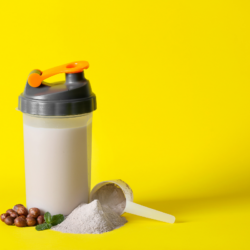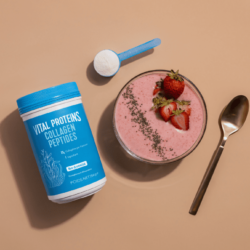Gaining lean body mass is no mean feat. There are various stages to follow to achieve this muscular objective. Whether you’re a beginner or a top-level athlete, determination and, above all, self-discipline are the first steps on the road to success. The adventure will certainly be long and difficult, but don’t worry, it’s not impossible. In this article, find out how to gain lean body mass effectively .
Dry weight gain, in brief
Gaining mass in bodybuilding is a key process for bodybuilders, athletes and fitness enthusiasts. It aims to increase the amount of muscle in the body, often with the aim of improving strength, performance, metabolism and health, as well as physical aesthetics.
How does mass gain work?
- Caloric increase: This generally involves increasing your daily calorie intake. This dietary strategy, combined with intensive weight training, provides the body with the energy and nutrients it needs to build muscle.
- Macronutritional balance: A diet rich in protein and moderate in carbohydrates and fats is often recommended to support muscle growth and recovery.
- Targeted Training Routines: Specific strength training exercises are essential to stimulate muscle growth. This includes compound exercises such as squats, deadlifts and bench presses.
Why is mass gain important?
Gaining muscle mass is a common goal in the world of fitness and sport, but why is it so important? From a functional point of view, increased muscle mass translates into increased strength and the body’s ability to perform physical tasks. This improvement is crucial for sporting performance, enabling athletes to reach higher levels in their respective disciplines.
Aesthetically, increased muscle mass makes a significant contribution to physical appearance. For many exercisers, having well-defined, sculpted muscles is a major objective. This aesthetic quest goes beyond mere appearance; it often reflects a commitment to a healthy, disciplined lifestyle.
Finally, in terms of health and well-being, a muscular body is often associated with better overall health. Strong, well-maintained muscles can improve posture, helping to prevent back pain and other musculoskeletal problems. What’s more, a well-muscled body can play a role in reducing the risk of certain diseases, particularly those linked to metabolism and the cardiovascular system.
Physical activities for building lean body mass:
Weight training is essential for effectively developing lean muscle mass. According to a study published on PubMed, ten weeks of resistance training can increase lean body mass by 1.4 kg, increase resting metabolic rate by 7% and reduce body fat by 1.8 kg. Resistance training also helps to improve physical performance, control of movement, walking speed, functional independence, cognitive ability and self-esteem (1).
Key exercises for muscle growth
Compound exercises are crucial for maximising time spent in the gym and stimulating all muscles effectively. Here are some examples of recommended exercises:
- Squat: Stimulates the hamstrings, glutes, quadriceps and creates isometric tension in the upper back.
- Deadlift: Strengthens the trunk, upper back and hips, and corrects the rounded posture caused by a sedentary lifestyle.
- Overhead Press: Strengthens the shoulders while keeping the core tight and stable.
- Pull-Up: Ideal for strengthening the back, providing a solid base for bench presses and squats.
- Bench Press: Targets the chest, shoulders and triceps.
- Row: Targets the rhomboids in the back as well as the biceps.
Tips for an effective training programme
- Variety and progression: Vary the exercises and gradually increase the intensity or volume.
- Monitoring and adjustments: Listen to your body and adjust your workouts according to your progress and your state of fitness.
- Professional consultation: A sports coach can guide you towards the best exercises for your specific goals and help you avoid injury.
By following these principles and incorporating these exercises into your training routine, you’ll maximise your chances of successfully gaining lean body mass. It’s important to remember that consistency and commitment to the process are essential to achieving your fitness goals.
What should I eat to gain lean body mass?
Nutrition is essential in the process of gaining lean body mass. It is important to recognise that nutritional needs vary from person to person, and that there is no single diet that is right for everyone. However, certain guidelines can be followed to optimise your diet.
Summary table of dietary recommendations :
Okay, here’s the chart adjusted using kilograms instead of pounds, according to the information in the Mind Pump articles:
| Food Category | Recommendations | Food Examples |
|---|---|---|
| Calorie Surplus | 250-500 calories more than maintenance | – |
| Protein | Approximately 1.8 to 2.2 g/kg body weight | Meat, fish, eggs, Greek yoghurt, lentils, protein powder, tofu |
| Fats | Approximately 0.66 g/kg body weight | Oils, avocado, nuts, seeds |
| Carbohydrates | Make up the rest of the calories, around 1.65-4.4 g/kg body weight | Rice, oats, potatoes, quinoa, beans |
| Food quality | Prioritise minimally processed foods | Whole foods, minimising processed products |
| Monitoring and adjustment | Adjust according to the body’s response and progress | – |
By following these recommendations, you’ll be able to build a diet tailored to your lean mass goals, while preserving your health and well-being. It is always advisable to consult a dietician or health professional for personalised advice.
Food supplements for effective lean weight gain
When you’re working hard to build lean muscle mass, choosing the right supplements can play a crucial role in your results. Scientific studies, including those published on PubMed, have identified several key supplements that can effectively support your bodybuilding efforts.
Creatine
Creatine is recognised as a very popular ergogenic supplement among athletes, offering multiple benefits including a significant increase in lean muscle mass and exercise capacity when used in short-duration, high-intensity exercise. In addition to strength gains, creatine supplementation may also offer additional benefits such as improved post-exercise recovery, injury prevention, rehabilitation, as well as potential neurological benefits that may be relevant to sport. Studies have shown that short- and long-term supplementation is safe and well tolerated in healthy individuals and in several patient populations(5)
Proteins
Protein supplementation plays a key role, especially for those who intensify their training. Protein is fundamental to supporting muscle hypertrophy, an essential process for building muscle mass. This protein supplementation is not only beneficial for seasoned athletes; it also offers significant advantages for beginners or untrained individuals.
One of the main benefits of protein consumption is improved strength gains. Proteins provide the amino acids needed for the repair and growth of muscle fibres, which is crucial after intense exercise. They also play a role in boosting aerobic and anaerobic power, key components of sports performance.
It is important to note that protein supplementation must be tailored to individual needs and integrated into a balanced diet to be effective. In conclusion, whether for high-intensity training, improving muscular strength, or boosting aerobic and anaerobic performance, protein supplementation is an essential component of a well-structured training programme (5)(6)
Other supplements to consider
When it comes to supplements designed to improve sporting performance, two categories stand out: nitrate and caffeine, and polyunsaturated fatty acids. Nitrate and caffeine are recognised for their beneficial acute effects on muscle strength. Caffeine, in particular, is valued for its impact on increasing energy and concentration, crucial elements during intensive training.
On the other hand, polyunsaturated fatty acids, particularly omega-3s, play an important role in preserving muscle mass and strength. These fatty acids are essential for the body to function properly and can contribute to better muscle recovery and reduced inflammation. By incorporating these supplements into a suitable diet, athletes can optimise their performance and general well-being. (5)
The importance of recovery in building lean body mass
Recovery plays a crucial role in the process of gaining lean mass. It involves various aspects, including sleep, the use of red light, cold plunges, electrolyte management and fibre consumption. Here’s how these elements contribute to effective recovery:
1. Sleep :
- Impact on Health: Sleep is vital for cellular, organ and systemic functions. A lack of sleep can be detrimental to health. In addition, it can alter eating behaviour, glucose regulation, blood pressure and certain hormonal pathways. It can also promote a highly proteolytic environment, which is detrimental to muscle recovery after exercise.
2. Red Light :
- Photobiomodulation (PBM): The use of red or near-infrared light can stimulate, heal and regenerate damaged tissue. It can increase sports performance by reducing inflammation and oxidative stress in muscle tissue, and by increasing the muscle mass acquired after training.
3. Cold Plunge :
- Effects of Cold Water Immersion: Cold plunge immersion, at temperatures below 15°C, is a popular post-exercise strategy. Studies show that it can significantly reduce muscle soreness and fatigue after exercise.
4. Electrolytes :
- Fluid and electrolyte requirements: Fluids and electrolytes, particularly sodium, are essential for maintaining the body’s water balance, especially in athletes. Adequate consumption of electrolytes is crucial to avoid hypohydration. This can increase cardiovascular and thermal stress and impair aerobic performance.
5. Fermented foods & Fibre :
- Protein synthesis and muscle growth: Fermented foods, rich in amino acids, stimulate protein synthesis, which is essential for muscle growth and repair. Studies show that fermentation increases the availability of nutrients. This allows the muscles to absorb more essential compounds.
- Reduced inflammation and faster recovery: The presence of probiotics in fermented foods helps to reduce inflammation (2) and muscle damage associated with intense exercise, promoting faster recovery. Studies show that eating these foods can improve muscle recovery after training.
- Recommended fermented foods: Finally, include fermented products such as yoghurt, kefir, fermented cabbage (sauerkraut) and kimchi in your diet to reap these benefits.
References
- https://pubmed.ncbi.nlm.nih.gov/22777332/
- https://pubmed.ncbi.nlm.nih.gov/35651092/
- https://www.mindpumpmedia.com/blog/how-to-properly-bulk-without-gaining-fat
- https://www.mindpumpmedia.com/blog/is-clean-bulking-realistic
- https://pubmed.ncbi.nlm.nih.gov/30604177/
- https://pubmed.ncbi.nlm.nih.gov/25169440/





